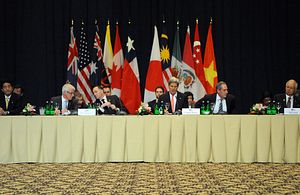As Trans-Pacific Partnership (TPP) negotiations continue in Maui this week, Investor-State Dispute Settlement (ISDS) is proving to be a hot domestic topic in party countries.
ISDS is a provision in bi- and multi-lateral investment agreements and treaties that allows investors to sue states over treaty breaches. The investment chapter of the TPP will almost certainly include an ISDS procedure.
ISDS has been subject to negative criticism by prominent politicians and parts of the media across most TPP party countries.
For these critics, there is distress that ISDS provides a channel for investors to sue governments. American Senator Elizabeth Warren has suggested that its inclusion would “tilt the playing field in the United States further in favor of big multinational corporations.”
Some believe that state sovereignty would be compromised by the inclusion of ISDS in the TPP. A New Zealand politician has brought a bill before Parliament to outlaw free trade agreements that include ISDS. Others are concerned that ISDS cases are frivolous and waste government money.
Many of these concerns have been overstated and deserve to be corrected.
Firstly, ISDS is not a new concept. The United States has 50 agreements with ISDS mechanisms and has never lost a case.
The United States already has international agreements containing ISDS with six of the eleven countries in the TPP. The other five countries (Australia, Brunei, Japan, Malaysia, and New Zealand) together have over 100 agreements containing ISDS mechanisms.
According to the Center for Strategic and International Studies (CSIS), over 90 percent of the nearly 2400 bilateral investment treaties in force worldwide have operated “without a single investor claim of a treaty breach.” For disputes that do end up in arbitration, states have won cases twice as often as investors. When an investor does win, awards are a very small proportion of the claim.
The case that has been frequently cited by critics recently is the Philip Morris Asia tobacco case, or the first and only investor-state dispute that has ever been brought against Australia.
Australia implemented tough anti-smoking legislation in 2011 that required all cigarettes to be sold in logo-free packages. Philip Morris Asia, a Hong Kong-based company, is challenging Australia’s legislation under the 1993 Hong Kong Agreement, suggesting the law interferes with its right to use its trademarks.
Signed in 1993, the Hong Kong Agreement does not include explicit ISDS safeguards, which have been written into Australia’s more recent agreements. While this case is still yet to be decided, it only strengthens the point that strong ISDS provisions need to be written into investment treaties and agreements.
The reason investors are usually unsuccessful in bringing ISDS cases against states is because trade negotiation officials ensure significant protection provisions are included in agreements containing ISDS. It is clear that ISDS provisions are all in the language, and that the TPP will incorporate the results of more than 20 years of reform in ISDS.
According to the Office of the US Trade Representative, the TPP will have state-of-the-art ISDS protections. It will give TPP party countries the ability “to protect legitimate public welfare objectives such as public health, safety, the environment, and the conservation of living or non-living exhaustible natural resources.”
The case record around the world can also be instructive. In the Chemtura v. Canada case, for example, an ISDS panel rejected a claim that the Canadian government’s actions to ban the use of a chemical product breached Canada’s obligations under the North Atlantic Free Trade Agreement (NAFTA), and underscored the right of government to pursue its own scientific and environmental regulations.
If TPP regulations are as strong as these, and recognize each country’s inherent right to regulate in important areas such as health and safety, government sovereignty will not be compromised. Hence, it is in the fundamental national interest for governments to ensure strong ISDS provisions are included in the TPP to prevent the sort of scenario critics outline.
Whether TPP negotiations are concluded this week or not, it is certain that ISDS provisions will be included in the investment chapter. It is therefore important that the public in each party country is made aware of the facts surrounding ISDS in order to put the mechanism into perspective.
Sinclaire Prowse is a Non-Resident WSD Handa Fellow at CSIS Pacific Forum. She holds a Master’s Degree in United States Studies from the University of Sydney, Australia.

































